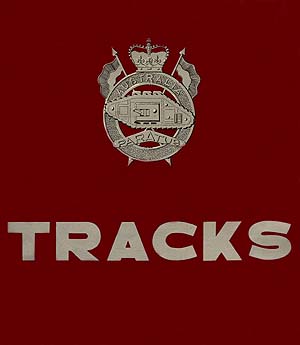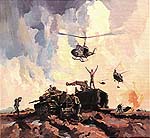Tracks Magazine - August 1955


A couple of decades ago I was travelling through northern NSW and called in to see Archie McDonald, an old 1 Armoured Regiment LAD mate. Archie had kept his copy of the first issue of the Regiment's glossy magazine, Tracks — August 1955. It is this magazine that is re-produced below
Tracks Magazine
Index
Foreword Preface Principles of Employment of Armour Tracks To Tradition Keep An Open Mind Review of Squadron Activities Regimental Headquarters Headquarters Squadron Reconnaissance Troop A Squadron Notes B Squadron Notes Nucleus Squadron Regimental Training Troop Light Aid Detachment, RAEME Signals Troop, RASigsIndex (cont)
Review of Allied Armour Tanks in The Jungle Korean Sidelights Equipments 1954 .. A Royal Occasion On Parade Officers' Mess Notes Sergeants' Mess Notes In The Realm of Sport It Could be You The Adjutant's Dilemma While Others Sleep [et al] Beauchamps Own Epilogue Free Verse From A Free Thinker

Elevating Gear
From the time that bishops, truly the militant churchmen, raised, drilled and lead their own troops, to the present hour, the church has been closely identified with the armies of Britain. Less martial pursuits now beckon the Chaplain in joining the colours of the Queen. Less martial, but no less urgent, for in his heart there is a desire to minister to men and, in the main, to men who ordinarily the church would have little chance of reaching.
Humanity is prey to many problems, heir to many disorders of mind and soul, and army personnel provide a fair cross-section of these things. It is to this need that the Chaplain will address himself, and for this need will he accept the restrictions of army life. Such service is a glad service, for it is rendered for the highest motives, as to God, the Queen and to our fellow men. The long history of the British Armed Forces enshrine the annals of dedication and sacrifice on the part of gallant men and women, not the least of whom are found among the ranks of the Chaplain's Department.
The work of the Chaplain is recognised by the Army and his position is clearly defined and protected, not for personal convenience, but to facilitate the ministry he feels called to do. Appreciation must be expressed for the ever helpful, sympathetic and co-operative approach found towards the Chaplain by the Commanding Officer, staff and members of this Regiment.
Chaplains have their failings — no man is ever perfect. Dress and position does not free any man from those things which shadow the better hours and plague the happier moments of us all. It is because of the knowledge of such things that the Padre (for such is the more intimate and affectionate title bestowed) joins the colours. His duties are somewhat manifold and sometimes difficult to define. Many feel that he is primarily here to conduct church parades; such, of course, play an important part in Army routine. We are happy that such parades are voluntary in nature, we are happy when men feel the opportunity and take it. We need to be reminded of the presence of God. Services are governed by an Order of Service, somewhat more formal than some appreciate, somewhat less formal than others would like. We accept the limitations for the sake of unity (but we do wish something could be done about the hymn section). The attendance of men one has learned to like is an encouragement for the Chaplain. Let us, however, not be mistaken in the duties — they extend far beyond the conduct of parades. Morale and spiritual welfare move in a wide orbit, personal problems for private interview and necessary action are a part of the Padre's job — many fellows would save themselves, and their loved ones, much trouble if early consultations with the Chaplain were sought.
Hospital visitation is yet another aspect of morale and welfare. Sheer friendliness is another approach open to the Padre, whose usual delight is to move among the men and get to know them. He is honoured when they respond with a comradeship which is so choice as to be counted among life's better gifts. A watch is kept by the Chaplain upon other matters within the daily routine of the soldier's life, a keen and sympathetic eye is kept upon his conditions of service. He even puts in a good word about leave and transfers, although I have a fancy that this is known by the men! There are times when there is a Unit journal to edit!
Cartoon Character Preaches a Sermon
Donald Duck is a genial and whimsical fellow, one whose many adventures so often enliven the screen. Today, he posed as a preacher! True I does not assume clerical garb, nor does his loquacious tongue say much in the way of a sermon He has an urgent message, all the same.
We were in a Newsreel (Hour Show in Victoria) recently, and there we viewed the pictorial report of the last atomic experiments at Nevada. Automatic cameras recorded the "close up" details of the ravages to property, and through dummy figures, to life itself. Such swift and complete havoc spelled disaster unlimited and the watching audience sat appalled and breathless with the signs of impending doom heavy about them. At the highest pitch of the emotional crisis, the screen suddenly glowed with colour and on marched Donald Duck. What a relief! The adventures and misadventures of this beguiling and often irascible rascal, soon charmed the fears away.
This is the reflection of the mood that says, "Eat drink and be merry for tomorrow we die." David, in the face of a great personal disaster, amid the blackened ruins of his city, bereft of loved ones and condemned by followers "Encouraged himself in Lord his God". It is not the forgetfulness ministered to by Donald Duck, but the personal relationship with God that must match the modern mind and meet the modern's need. It is a pity that so many people seek to exist without any invisible means of support. One prime duty the Padre possesses is that of constant reminder on these things. Unseen but not unreal and when believed, not unseen either! Personal relationship with God through faith in Jesus Christ is not an insurance policy for further atomic disaster; it is a way of life which gives life a meaning and survives the ravages of risk in a free-willed man's existence.
MORALE
MORALE is not a lot of little things — A cup of coffee, a pack of cigarettes, A pillow to sleep on, an extra dollar in the check. These things may build contentment, But Morale is something more; It is a quality of the Spirit, Which makes one resolute when contentment is gone, Brave when reverses have fallen, Confident when the earth seems rocking beneath one's feet. Morale is what makes a man fight on When muscles are aching and every movement is painful, Fight on when strength is spent and nerves are raw, Fight on when all seems lost But the will to keep on fighting. Morale is what makes a man smile In the face of Death and Hell, And when he falls, if fall he must, To go down in flames — with triumphant shout — Knowing that VICTORY is sure. Morale is not an aggregate of things, But a great and glorious Something, So rich that money cannot buy it, Yet so common that the poorest man may claim it: It is man's basic determination to be decent, To be strong, to be loyal, to be free. It is the biggest thing in a man's life, As high as Hope, as deep as Faith, as unfailing as Love. It is rooted in religion itself — The clear and unmistakable sign That man walks with his hand in the hand of God. It was Morale that spoke in ancient Galilee When Christ on the road to Calvary declared. "Be of good cheer! I have overcome the world!"
GRID REFERENCE- PUCKAPUNYAL
Situated some 60 miles north of Melbourne, in the State of Victoria, a place of undulating terrain scarred by numerous watercourses and watered by several creeks, swept by winds, sometimes dustladen, at others hot or frigid, Pucka has been an army area since 1939. The surrounding countryside has been walked upon, marched over, fired across, dug into, carried away, and often swallowed by first the A.I.F., the Regular Army, and in later years by the National Service Trainee. Of recent years the screech and roar of the tank and the imprint of tracks have written yet another chapter in the history of this centre. The precise meaning of the aboriginal word, Puckapunyal, is lost in the mists of obscurity. It has been variously defined as The Place of Many Eagles, The Place of Much Water, The Valley of the Many Winds — the balance of probability favouring the latter. Other names have also been applied to the area, but of these modesty forbids a recounting.
Seymour, an important rail centre, is the nearest town of note, the citizens of which, long accustomed to the tread of martial feet, appear to pay scant attention to the presence of the camp, except perhaps to engage in the profitable business of providing for the off-duty needs of the soldiery.
The camp area has recently undergone many changes and future plans envisage the provision of added housing (we hope!) and other buildings soon to make old Pucka hardly recognisable by the old Digger of yesteryear. The married quarters comprise some 460 homes, which are built on the prefabricated principle and equipped with mod cons for rural living. These cottages are reasonably comfortable and commodious. Family needs are met by the store run by the Canteen Services and have a wide range of commodities. An Infant Welfare Centre and Kindergarten greatly aid in family life, which, indeed, would be the more fully helped by the adequate provision of medical and hospital services. A State School nestles among the army buildings and provides a service which reflects much credit upon all concerned with it. Children of high school age travel daily to Seymour by special parlour bus.
Other amenities planned for the area include a swimming pool, an Olympic oval, a new picture theatre to replace that destroyed by fire. There is a well-equipped club for men of the Regular Army. This includes games rooms, dry canteen, snack bar, billiard rooms, wet canteen and beer garden. Other ovals cater for a diversity of sporting interests and the golf course, if at times erratic, is commendable. Radio Puckapunyal provides a short-wave broadcast of local talent and news. This effort by the Royal Signals is commendable and considerable.
The Brigade Area is marked by a beautification scheme, which includes the erection of new brick buildings and the repainting of existing huts. Gardens spring up in verdant beauty and every encouragement is given the home gardener. The Brigade Headquarters is a neat if inadequate area marked by a rose garden and native trees.
Spiritual welfare is not overlooked and the area has within its bounds a very chaste R.C. Chapel, St. Ignatius; the Church of England is represented by St. Mark's soon to be opened, while the Protestant denominations have at this moment a brick chapel on the drawing board with money for immediate erection.
A Camp Hospital meets the minor medical needs of the troops, while a Dental Centre provides prompt and efficient attention.
It seems obvious that future plans will both enlarge and adorn the now historic area of Puckapunyal. A new era of expansion will make Pucka a magnificent, if oft-maligned, part of Southern Command activities for years to come.


